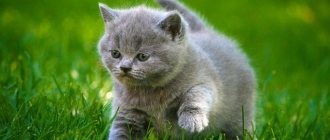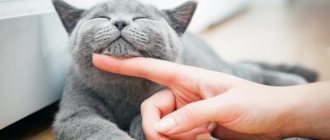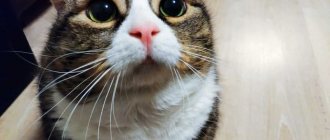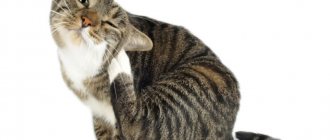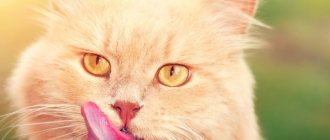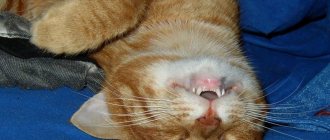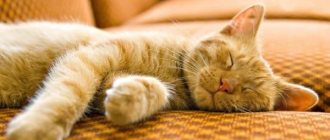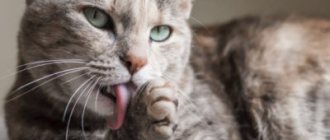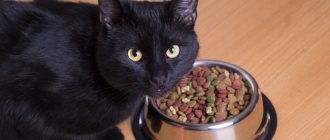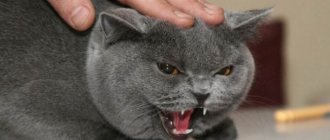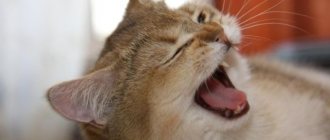A pet's excessive appetite should not be ignored. This could be a signal of serious health problems or a nervous system disorder. But most often we are talking about physiological reasons.
Finding out what happened is the main task of a loving owner. Ignoring the reasons why your cat constantly asks to eat can lead to unpleasant consequences for your pet.
Normal feeding frequency and portion sizes
The pet's diet includes store-bought dry or wet food, as well as natural food. The serving size depends on the age of the pets and their activity.
For kittens
Kittens need to eat frequently for normal growth and development. However, the volume of the portion received should be small so that the baby has time to digest the food received.
An excess of food or, conversely, a lack of it leads to disturbances in the formation of the body. Digestive disorders, obesity or nutritional deficiencies may occur. The frequency of feeding a kitten depends on its age. At the beginning of complementary feeding - 5 times, gradually the owner should reduce the frequency of feedings to 2-3 times by 6 months.
The volume of the daily portion of dry food depends on the age of the baby. So, at the age of 1-2 months, it will be enough for a pet to eat from 30 to 50 g of store-bought food per day. From 2 to 4 months, the kitten is given 40-65 g, from 4 to 6 months - 55-70 g. From six months of age, the norm of dry food reaches 60-80 g.
Wet food is also introduced gradually, starting complementary feeding with 120 g per day. Gradually, the volume of canned food or natural food is increased to 250 g by 6 months.
For adults and active animals
Food helps adults stay active and energetic. A properly selected diet should contain the right amount of animal protein, vitamins and microelements.
An adult cat is fed no more than 2-3 times a day. The amount of food depends on the weight of the pet. Dry food is given at the rate of 12-15 g per 1 kg of cat weight. So, a mustache with a body weight of 3 kg should receive about 45 g of “drying”.
Wet food and canned food are given in a volume of 60-70 g per 1 kg of weight, or 5% of the total weight of the animal. The serving size for a 3 kg cat will be 180-210 g.
Natural food for active adult fluffies should consist of meat, cereals, vegetables and dairy products. The main part of the diet is meat and offal. The animal needs to eat up to 30 g of protein products per 1 kg of weight per day. The daily intake of cereals is about 15 g, vegetables – 10 g, fermented milk products – 20 g.
For older people
The nutrition of older cats should support the normal functioning of all organs and systems and not cause digestive disorders. The menu should contain easily digestible food appropriate to the age of the individual.
In terms of the frequency and volume of portions, the diet of an elderly mustache does not differ from that consumed in an active age. If the cat is obese, the daily portion can be reduced by 10-15%.
How often to feed kittens
How a cat behaves before giving birth: yelling and other changes in behavior
Small pets are fed more often. A newborn kitten, which for various reasons has been left without its mother's milk, is given food every two hours without stopping at night. Babies up to two months of age are fed every 6 hours. At the age of 4-5 months, kittens are transferred to a three-time diet. After six months they can be fed two or three times a day.
Kittens require special attention
Why does a cat constantly eat, but does not get enough and even loses weight: physiological reasons
There are times when a cat asks to eat even after it has received the required amount. Increased appetite becomes a signal for the owner - it is worth paying attention to the health of the pet and finding out the possible reasons. Sometimes this will require a visit to the veterinarian.
Worm infestation
Worms have an extremely negative effect on the body of the mustache. The cat begins to lose weight, although the amount of food he consumes increases. Weight loss, nausea, vomiting, diarrhea or constipation are the main symptoms of helminthic infestation.
In addition, the infected individual develops food preferences that are unusual for it. In general, the condition of the furry friend is depressed and lethargic. In advanced cases, helminths are visible in the vomit and feces. Antiparasitic drugs prescribed by a veterinarian can help a suffering cat who is constantly hungry.
Problem with nutrient absorption
The furry glutton has difficulty absorbing nutrients. Because of this, the mustache feels hungry and asks for food too often. Absorption disorders are symptoms of a serious pathology. These include malignant neoplasms and problems with the pancreas.
Hormonal disorders
Disturbances in the production of hormones lead to the fact that the cat constantly asks for food. Problems in the functioning of the endocrine system cause the development of diabetes, kidney failure, hypothyroidism and other ailments. In addition to a strong desire to often approach the bowls for food, sick individuals exhibit a strong thirst.
Only a veterinarian can diagnose disorders. He also prescribes appropriate treatment to maintain normal condition.
Starvation, exhaustion or insufficient portion size
Increased appetite in pets is a consequence of forced starvation or exhaustion. Some veterinary procedures require the animal to fast for long periods of time. And sometimes the animal gets lost and spends a long time without food.
A hungry person pounces on food and asks for more even after feeding. In this case, overeating, which is bad for digestion, should not be allowed. Portions should be small, but an exhausted mustache should be fed frequently.
Pregnancy in females
All pregnant individuals eat a lot, going to the bowls even after feeding. During this period, a lot of nutrients and vitamins are required for the normal gestation and development of newborns in the womb of the cat mother.
If a pregnant cat is constantly hungry, then her menu should be changed. High-calorie dishes enriched with vitamins and microelements are suitable for feeding. It is not recommended to overfeed the expectant mother, so as not to cause complications during childbirth.
Extreme cold
On cold days, the mustachioed friend's body spends more energy to heat itself. To replenish energy loss, the animal needs more food. During the winter and autumn, the owner should increase the serving size and increase the nutritional value of the dish - then the mustache will not often look into the bowl.
Taking medications to suppress hunger
Medicines prescribed to treat various diseases provoke too much appetite in your pet. This is how enzyme, anticonvulsant and hormonal medications act on your furry friend. Increased hunger is a side effect of medications.
How often to give food to adult animals
Some owners feed cats as soon as they start meowing and asking for food. This is a big mistake. Overeating can lead to obesity and a number of diseases.
After sterilization, the cat asks the cat: is this normal and what to do?
It is better to feed an adult cat twice a day, morning and evening at the same time. This diet promotes the proper functioning of the animal’s gastrointestinal tract.
Note! There are exceptions. Sometimes sick cats need to be fed little by little 3-5 times a day. For pregnant and lactating pets, the frequency of meals also increases.
Why does my cat always ask for food even though he's not hungry?
The desire to snack in individuals of any age is caused by both physiological and psychological reasons. They cannot be ignored, because in advanced cases they lead to the development of chronic nervous conditions.
Competition for food with other pets
Living in the same house with other pets makes you want to be first at the food bowl. Even a mustache that has eaten a hearty meal will not want to give the food left on the plate to its relative. The greedy person will try to be the first to be at the feeder and quickly eat not only her own, but also someone else’s portion.
Eating stress
False hunger is a sign of psychogenic polyphagia, which occurs against the background of eating disorders. An excessive increase in appetite develops due to severe emotional shock. Stress is provoked by various reasons: long separation from the owner, a trip to the veterinarian, change of place of residence.
Lack of attention
Fluffy pets really need care and affection from their adored owner. If the owner ignores the pet’s desire to take him on his lap and caress him, then sooner or later the animal will begin to suffer from lack of attention. Your furry friend will be worried and bored.
To attract the attention of a person, the cat will begin to constantly ask for food. This is not only an opportunity for him to attract the owner, but also a way to cope with stress.
Fear of hunger in street animals
Homeless mustaches survive in very difficult conditions, so they are always in search of food. Even when they find themselves in a family of loving owners, former street animals do not immediately get rid of old habits.
Cats are afraid of hunger, so they too often go to the bowl of food and wait for more - so that they can eat for the future. Individual comrades can stock up by hiding food in different parts of the house.
Have you noticed that the cat licks its fur in an unusual way?
This problem often concerns castrated animals, which, due to hormonal changes, actually have an increased appetite. This is usually a temporary phenomenon, and it goes away as soon as the cat’s body adapts to its new state.
If your tailed pet is overweight and asks for more, this indicates that the cat has a stretched stomach and needs more food to be satisfied. In this case, you will need the help of a veterinarian, since it is not so easy to put an overweight cat on a diet.
Sometimes the normal process of grooming becomes obsessive. This excessive licking is a signal that there is a problem.
Licking that causes excessive hairball regurgitation or even balding skin is abnormal. The skin is exposed to sunburn, hypothermia and other adverse environmental influences. Intact skin is resistant to infection. If a cat licks its fur to such an extent that it breaks the integrity of the skin with its rough tongue, infection may occur in these places.
The infection, in turn, increases the intensity of licking. Thus, a vicious circle of “infection-licking” is formed. It can be broken only by identifying and eliminating the original cause. The owner can check for the presence of parasites (fleas, lice, etc.) in the cat's fur; in addition, consultation with a veterinarian is necessary.
If your cat licks its fur too often or for too long, do not ignore this fact. A cat can lick itself to such an extent that there is no hair left on the skin. Usually, owners notice that the cat licks its fur too often when bald spots appear on the stomach and other easily accessible places on the body.
According to Doctor of Veterinary Medicine (DVM) Pamela Perry of Cornell University's Animal Behavior Clinic, the average cat spends 30 to 50 percent of its grooming time grooming. This is quite a lot, so owners do not pay attention to the problem until they notice significant hair loss or even skin damage.
Read also: Why does a dog vomit after eating?
We invite you to read: How to measure a cat’s temperature at home?
Allergy to food
One reason may be an allergic reaction to food. For example, dry food may contain plants that cats do not naturally eat.
In what cases should you contact a veterinarian?
There are situations when the owner should not hesitate to visit the veterinary clinic. Sometimes a cat constantly asks for food because it is suffering from serious illnesses, and hunger is just one of the symptoms. Other warning signs include:
- vomit;
- temperature increase;
- digestive disorders;
- weight loss;
- apathetic state;
- dulling of fur;
- discharge from the eyes or nose.
A sick pet often seeks solitude and tries to dodge the caresses of its owner. Sometimes a suffering mustachioer cannot stand being in bright rooms, trying to crawl under a table or bed. Such signs, along with a feeling of excessive hunger, are symptoms of health problems.
Do cats feel full?
Cats have a conditioned feeling of satiety - otherwise they would eat constantly and without interruption, unable to stop eating. Usually, after eating, they settle down in their favorite cozy place, curl up into a ball and sleep sweetly.
The fact that a cat constantly reacts to the rustling of food bags does not mean that she is asking for food. Her instincts simply kick in - the signal is given, she needs to run up and meow.
The feeling of fullness may vary: some eat when they are hungry, others eat at the first opportunity. Just as people, having had enough of dinner, do not refuse ice cream, cats will always find room for “dessert”.
How to keep your pet's weight within normal limits
A veterinarian will help you find out the nutritional norm. In addition, approximate daily allowances for mustaches of different ages and different body weights are indicated on food packages.
Should I limit the amount of food I eat?
Restrictions on the amount of food will only help those pets who suffer from excess weight or food allergies. A special diet is provided for such cats. By adhering to a certain regime, the glutton will restore normal body weight and will be able to lead an active lifestyle. In other cases, restrictions on the volume and frequency of feeding are not correct.
How to tell if your cat is malnourished or obese
An attentive and caring owner always sees when something happens to his pet. Problems with underweight or excess body weight are very visible. Obesity is characterized by low activity, the appearance of fatty deposits and folds. Thinness is noticeable through too sunken sides and a protruding spine.
The owner’s main task is to find out the cause of the pet’s painful condition. It is impossible to do this on your own. Only a veterinarian can make a diagnosis and prescribe treatment.
Situation 8: we got a second pet - and the first one began to attack food
“We have a cat who has always had a normal appetite, sometimes even a bad one. But as soon as we got a kitten, after about a week the cat began to eat like crazy. Sweeps everything they give. A month has already passed and she has recovered a little. What with her?"
This is a common situation: the feeling of competition encourages the animal to eat more greedily. Often cats begin to eat a lot when under stress or when a new family member, not necessarily even an animal, arrives. In this case, increased appetite can last for several months until the stress passes, or remain forever, because... competition will not go away. The only thing that can be done here is to feed the pets separately, or to provide the old-timer with a higher, secluded place, for example, on a windowsill, and protect him from the newcomer’s attempts to take away the food.
Reasons for cat night concerts
Why does a cat meow for no reason at night? This often occurs in animals during estrus. Continuous screams at night may also indicate illness.
However, most often a cat screams at night because it cannot sleep. It is possible that her sleep-wake pattern is disrupted. Night meowing greatly disturbs the peace of the owners. In this case, you need to make sure that the cat sleeps as little as possible during the daytime. It is also useful to arrange active games with the animal more often during the day. This will ensure your pet sleeps soundly at night.
When is there nothing to worry about?
All of the listed symptoms of cat gluttony are removable and should not cause concern to owners unless severe exhaustion/obesity, vomiting after eating, or deterioration in the condition of the coat and teeth are observed. Polyphagia can be overcome by properly organizing the feeding of the purring cat.
During the period of active growth and development, which lasts about 2 years, kittens have a great need for nutritious, balanced food. They spend a lot of energy and try to replenish it by eating more than normal. If the kitten eats a lot, grows quickly and remains energetic and playful, then there is nothing to worry about.
Babies need a lot of energy
Peculiarities of eating behavior also depend on the breed, so owners should be aware of their cat’s daily calorie requirement, as well as how this parameter changes depending on the pet’s age.
Female felines may experience an increased appetite after the end of estrus, when they try hard to make up for the lack of calories by eating. During heat, a cat completely loses its appetite due to nervousness, but subsequently they simply eat up, absorbing food in unlimited quantities.
Attention! Older cats show more interest in food than young cats. An active, non-obese pet with a slightly increased appetite should not cause concern.
Dominance of other cats
If you have more than one cat, a hierarchy inevitably builds up in the cat community: someone considers himself more important, which inevitably causes conflict with varying degrees of mutual aggression.
A cat that is afraid of letting its guard down and being ambushed may want to avoid visiting the cat cafeteria. And considering that in the wild, cats are able to starve for several days without harm to the body, such voluntary abstinence can last quite a long time.
If you have a lot of cats, make sure there are several feeding areas in the house and arrange them so that your pets feel safe while eating.
Diabetes
In diabetes mellitus, nutrients are not absorbed in the body, which causes energy deficiency.
The disease is characterized by the development of metabolic pathologies that provoke absolute or relative insulin deficiency. As a result of such a disease, metabolic processes of all systems are disrupted. There is a failure of carbohydrate, fat, protein, mineral and water-salt balance.
We invite you to familiarize yourself with: Breeds of black cats. Photo and description
Despite the efforts of the owners and the good diet of the animal, nutrients cannot be absorbed into the body, since a lack of glucose provokes an energy deficit for this process. And glucose itself is absorbed only with insulin, which is not enough as a result of a failure of metabolic processes.
Symptoms
One of the symptoms of diabetes is constant thirst.
- With excessive appetite, the pet sharply loses weight, and the amount of urine output increases.
- Peripheral neuropathy manifests itself - the animal walks, leaning on the entire foot, the gait is uncertain, unsteady.
- The cat becomes weak, lethargic, and reluctant to make contact.
- The smell of acetone is felt from the oral cavity, the skin becomes thinner, the coat is disheveled, dull, a sickly appearance and a dull look.
Treatment
A properly selected diet is the key to successful treatment of a cat.
It is recommended for pets who have recovered from this diet to remain on this diet for the rest of their lives. Sugar-lowering tablets and insulin injections are used.
If diabetes is suspected, the owner can independently check the sugar level. To do this, you will need to conduct a test using special urine strips. It is also possible to use a veterinary glucose meter to check your blood sugar levels. The physiological indicator of sugar in the urine is its absence. In the blood - from 3.3 to 6 mmol/l.
How to gradually accustom a cat to dry food?
The entire training process will consist of several stages. First, you should soak the dry food in milk or broth. Of course, clean water will do. But in the first case, the food will be saturated and taste even better.
Secondly, constantly mixing such food with ordinary and familiar ones. And, as mentioned above, its gradual increase. Over time, you can conduct the following experiment. Place dry food next to regular food, without mixing, and watch the cat’s reaction. If your beloved pet eats both, then the job is done, if not, you should continue in the same way. If, despite all attempts on your part, the kitten does not want to eat dry food, you should use other methods.
Finding a toilet
A small animal may scream in confusion, not knowing where to relieve itself. In such cases, you should put him in a tray and, if possible, explain why this device is needed. Even if the kitten is accustomed to the tray, in a new place he may not understand what this piece of furniture is for, so it is necessary to show it. By the third or fourth time, the animal will definitely understand the purpose and location of the toilet. In some cases, once is enough.
If a kitten comes to a new home at a very early age (up to a month), it may be in pain if it wants to go to the toilet. The fact is that a cat constantly licks newborn kittens, and this action has different purposes. Mom doesn't wash the babies as much as she massages them. This stimulates the kitten's still weak intestinal peristalsis. In such cases, the owner needs to gently massage the pet’s tummy, starting the process of defecation.
When to start sounding the alarm?
The cat constantly feels a feeling of hunger and during the development of dangerous syndromes and diseases. One of the main dangerous reasons is impaired absorption of nutrients. This may be a congenital syndrome or a sign of a serious illness:
- inflammatory process in the intestines;
- bowel cancer;
- exocrine insufficiency.
With these diseases, poor absorption of food occurs and the feeling of hunger increases. The animal suddenly loses weight.

